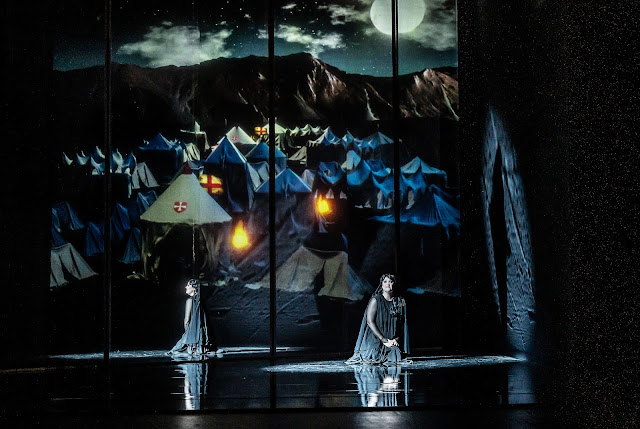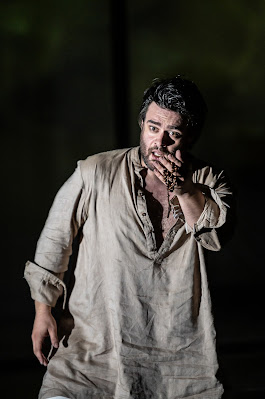 |
| Dvorak: Armida - Jennifer Davis - Wexford Festival Opera (Photo Clive Barda, ArenaPAL) |
Dvorak: Armida; Jennifer Davis, Gerard Schneider, Stanislav Kuflyuk, director Hartmut Schörghofer, conductor Norbert Baxa; Wexford Festival Opera
Reviewed 2 November 2022 (★★★★★)
A trio of superb principals, some superb music and a production that helps bring the drama to life make for a fine resuscitation of Dvorak's final opera
Coming three years after Rusalka and full of striking music, Dvorak's opera Armida has languished, failing to find traction in the opera house or the recording studio. It thus made a good fit for Wexford Festival Opera's Magic & Music season.
 |
| Dvorak: Armida - Gerard Schneider Wexford Festival Opera (Photo Clive Barda, ArenaPAL) |
The single set was a white, Moorish-inspired room with a transparent screen running diagonally across the space, thus providing a means of having action separated front and rear, but also facilitating magic effects using videos and Pepper's Ghost. So, in Act One, Armida has a vision of Rinald, and in Act Two, Ismen appears complete with his dragon, whilst we see both the destruction and reconstruction of Armida's palace in the second half. Costumes were a mix of styles, including contemporary Islamic references for Hydraot and Ismen, but chain mail and tabards for the crusaders.
The opera was the first major one that Dvorak had composed on a non-Czech theme and Jaroslav Vrchlicky's somewhat stiff libretto offers little in the way of opportunities for character development. What there are though, are a sequence of situations pregnant with Wagnerian possibilities, with echoes of Parsifal and Tristan. But before we get too carried away, it is worth bearing in mind that the role of Armida was written for the soprano who sang Rusalka, and that Armida and Rusalka's sinuous final duet seems more inspired by the closing scene of Verdi's Aida than anything else. And for all the Wagnerian ambience, the music is pure Czech.
The story might be an Italian take on events in the Middle East and the dramaturgy Wagnerian, but the melodies and rhythms are distinctly Czech. This disconnect is perhaps another of the subtle factors mitigating against the work's regular performance.
The two leading roles require singers with stamina and heft, alongside flexibility and the ability to sing a fine line. Both Jennifer Davis and Gerard Schneider had this in spades, added to which both looked physically convincing in their roles.
Jennifer Davis made a superb warrior maid with a fearless, gleaming voice. Yet her opening aria was beautifully shaped and her scenes with Schneider's Rinald at the end of Act Two and in Act Three had a luxurious, seductive quality. There was never any sense of having to control or rein in the voice, all seemed ease.
 |
| Dvorak: Armida - Stanislav Kuflyuk - Wexford Festival Opera (Photo Clive Barda, ArenaPAL) |
As Rinald, Gerard Schneider made a convincingly robust crusader, yet he also had a skittish spring in his step in the love scene in Act Three. His serenade of Armida was lovely and their duets ardent. But it is at the opening of Act Four that the real taxing moment came as Dvorak gives Rinald a Tristan-esque scena, a huge moment as Rinald rediscovers his Christian faith. Schneider was mesmerising here. Perhaps he did tire a little, understandably, but he still had enough power to join Jennifer Davis' Armida for the glorious yet touching final duet.
Completing the love triangle (and what is opera without a love triangle) was Stanlislav Kuflyuk as Ismen, displaying a thrilling helden-baritone. Kuflyuk impressed on his first entry in Act One, and each appearance brought something special. At the end of Act Two he spirited Rinald and Armida away on his dragon, and in Act Three his jealousy led him to aid the crusaders seeking Rinald. And each time, Kuflyuk thrilled musically too.
The rest of the libretto perhaps shows Vrchlicky's inexperience, both Hydraot (Armida's father) and Bohumir (leader of the crusaders) are underused. But Jozef Benci as Hydraot thrilled alongside Kuflyuk in Act One, whilst Rory Dunne was a solid presence in Act Two as Bohumir. Jan Hynk was vivid indeed as the crusaders' priest, Petr, the only person to be right about Armida in Act Two when she appears in disguise in the crusaders' camp.
Josef Moravec, Thomas Birch, Andrii Kharlamov, Christ Mosz and Josef Kovacic provided strong support as Rinald's fellow crusaders, with Kovacic and Moravec as the two who actually rescue Rinald in Act Three. Libuse Santorisova gave us some highly characterful seductive solos in Act Three.
 |
| Dvorak: Armida - Wexford Festival Opera (Photo Clive Barda, ArenaPAL) |
Schörghofer's production was admirably straightforward, telling the story clearly and directly, yet with plenty of imagination both in terms of the visuals and in the way he used the full auditorium in the first half, to great acoustic effect.
Norbert Baxa drew a fine performance of Dvorak's richly textured score from the orchestra. Dvorak's writing is multi-layered and full of details, all given their due, though there was a worrying lack of unanimity between stage and pit during the opening act.
The first two acts of Dvorak's opera are perhaps somewhat stiff, but from the end of Act Two things open up, leading to the wonderful freedom and drama of the final act. Dvorak evidently felt the opera could be reduced to three acts, and planned revisions. Alas he died before he could implement them.
As it was this fine performance showed that there are both musical and dramatic riches aplenty in this fascinating work. The production is a co-production with the theatre in Pilsen where Norbert Baxa is music director, so I do hope that Armida will have something of a shelf-life this time around.
Never miss out on future posts by following us
The blog is free, but I'd be delighted if you were to show your appreciation by buying me a coffee.
Elsewhere on this blog
- Intriguing work in progress: Alberto Caruso & Colm Toibin's The Master in its first full staging at Wexford - opera review
- Beyond Orientalism: Orpha Phelan's imaginative new production of Félicien David's Lalla-Roukh at Wexford - opera review
- Barbara Hannigan conducts Stravinsky & Knussen as part of a collaborative project between the Royal Academy of Music and the Juilliard School - concert review
- The Crown: American counter-tenor Randall Scotting his disc of arias written for the castrato Senesino and the research that went into creating it - interview
- Reflections on All the Ends of the World: violinist Lizzie Ball on her project with The Sixteen to highlight climate change and global warming - feature
- In search of eternal life: creating my cantata Et expecto resurrectionem, cryogenics, Burke & Hare, Frankenstein and more - feature
- Julian Phillips new piece alongside Britten and Schubert in a wonderfully imaginative programme for tenor, horn and piano at Oxford Lieder Festival - concert review
- Richly serious: mezzo-soprano Yajie Zhang and pianist Hartmut Höll in Brahms and Mahler in Oxford - concert review
- Orpheus at Opera North: greater than the sum of its parts - opera review
- Six musicians & four jugglers: introducing United Strings of Europe's Apollo Resurrected - feature
- Sarojini: Shruthi Rajasekar's new piece, premiered by Hertfordshire Chorus, merges Western classical and Carnatic musical traditions - concert review
- Persian inspirations: UK-based Iranian composer Farhad Poupel talks about drawing on rich Persian culture for his music - interview
- Home

.jpg)






%20Craig%20Fuller.jpg)


No comments:
Post a Comment